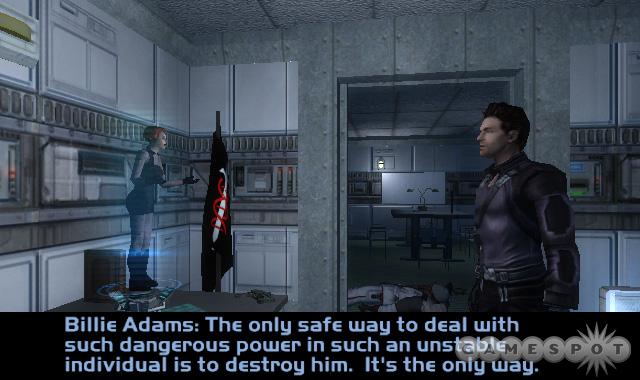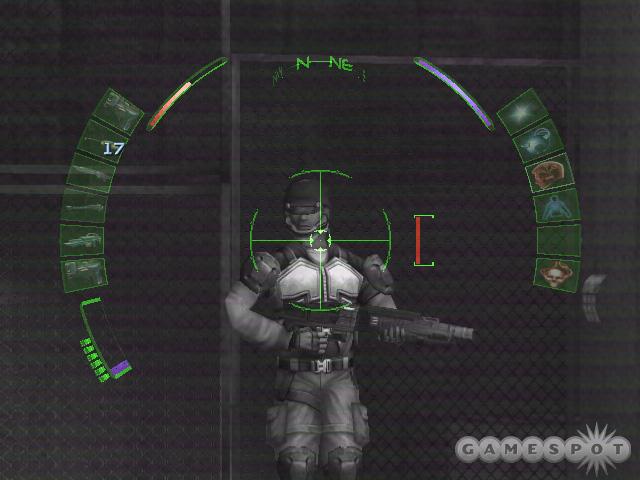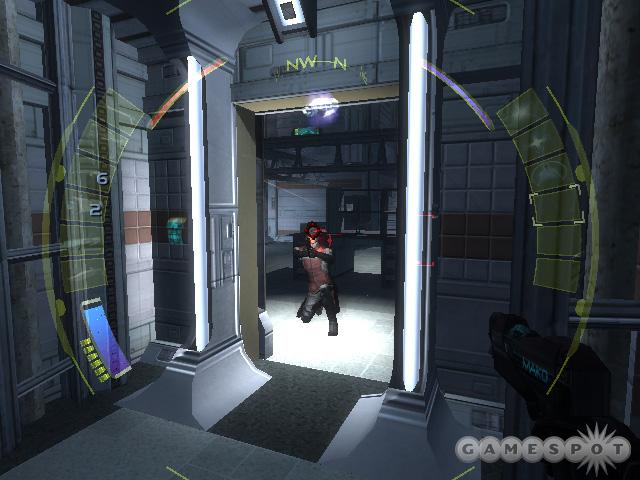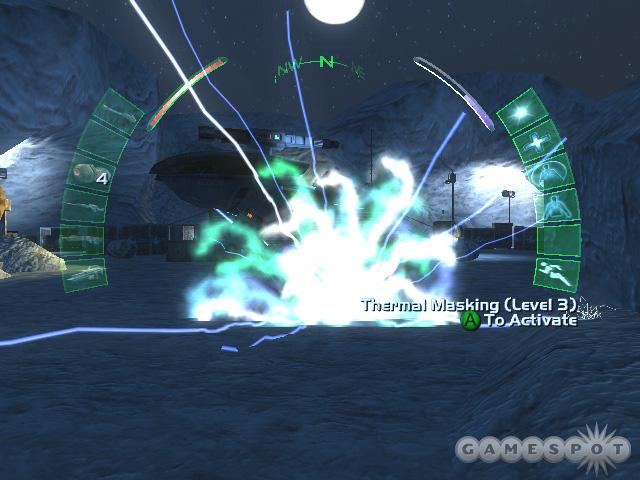Deus Ex: Invisible War Updated Preview
We get an exclusive look at the Xbox version of Ion Storm’s ambitious sequel to Deus Ex.
The original Deus Ex, released in 2000 for the PC and brought to the PlayStation 2 last year, garnered a deserved amount of attention when it was released. The unique game, developed by Ion Storm, was an ambitious blending of RPG, shooter, and stealth action elements tied together by a slick story. The sci-fi-themed title took place in a futuristic world where conspiracy theories were real, and secret societies controlled the government. For the upcoming sequel, Deus Ex: Invisible War, Ion Storm is offering up an even more ambitious game, with refined play mechanics, eye-popping visuals, and a deeper story. We've been able to take an exclusive look at the Xbox version of the game--the game is also slated to appear on the PC--and are pleased to report that it appears Ion has managed to tweak and expand on the core elements of the original game without breaking anything.

The game's story is an intricately created tale of conspiracies, power struggles, and religion infused with a healthy dose of paranoia. Sadly, the tightly constructed plot makes talking about it difficult without spoiling the experience. What we can say is that you'll assume the role of Alex D, an operative and a clone of the first game's protagonist, JC Denton. When you begin the game, Alex has just been transferred to a new training installation in Seattle following the rather spectacular destruction of the Chicago facility, which you'll see in the game's opening cinematic. Unfortunately the new digs aren't much safer, and the facility is attacked almost immediately after your arrival. The assault and its aftermath start you on a twisted and intriguing path through the game that will find you interacting with various factions, such as the corporation-like WTO and a radical religious group called the Order. Your road is a rocky one. Groups you encounter will attempt to play you against the others by using your skills. You'll have to decide, at key points during the storyline, which side you should take, and your choices will later influence who trusts you and who's out to get you. The nature of many of the choices presented to you calls to mind the light-side and dark-side character development seen in BioWare's Star Wars: Knights of the Old Republic, although it doesn't appear to be quite as deep.

The game's core structure is pretty standard and stays close to what you'd expect from an action RPG. You'll explore areas and complete assorted objectives in order to advance. Your objectives will include going to specific areas, talking to non-player characters, collecting items, or performing tasks. But, while the game has many RPG elements to it, the handling and presentation are closer to a first-person shooter. You'll see the world around you in a first-person view and interact with it via a cursor that will give you information on whatever object you have it centered on. The slickly designed interface lets you go through your inventory and weapons smoothly, and the inventory system has been changed in terms of how you hold items. You'll now have a set number of slots, which represent two belts you use to hold whatever you come across. Most items will now take up just a single slot, though some items, such as grenades, can be stacked in the same slot. In addition, the ammo system has been streamlined. You'll now have a common ammunition store, and each weapon will draw a different amount from it when used. You'll also find various items, such as binoculars and lock picks, to help you in your exploration.
Though Alex is a clone of JC Denton, he or she (you'll pick the character's gender when you start a game) will have some impressive new physical abilities. The skill system from the first game, which affected your weapon proficiency, is gone, and you can now use anything you find like a pro. The slick biomod system, a nannite-powered turbocharger for various parts of your body, is the ultimate in self-improvement. The special items you collect can be implanted into various parts of Alex's body, including the head, legs, and eyes. Interestingly, individual biomods seem to have different potential properties--when implanting a single leg biomod, you can choose to have it either enhance Alex's running speed or muffle his footsteps (but not both). It seems as though you'll be able to create a powerful and highly specialized character by choosing biomods that enhance only one ability, such as stealth, though you may very well be able to create a well-rounded character with different proficiencies in different areas. Later in the game, Alex will be able to purchase black-market biomods--though they're illegal, these powerful implants will let him perform extremely useful feats, such as reclaiming health from the corpses of slain enemies or overriding the control systems of nearby robots or turrets.

While the game structure and mechanics sound pretty straightforward, Deus Ex: Invisible War seems to be anything but, considering the deep story and the decisions you'll have to make. You will have options in almost everything you do, whether you're conversing with non-player characters, completing goals, or navigating the environment. Conversations will always have more than one possible response, your goals will always have multiple solutions, and you have options in how you navigate--just because you don't have a key code or a lock pick doesn't mean you can't get into a room. The level of freedom in the game is impressive, especially given its somewhat linear structure. The combination may not seem like it would work, but, as with the game's predecessor, it does.
Control is responsive and mapped out nicely on the Xbox controller, and there are several different configurations if the default layout doesn't meet with your approval. While you might think the PC game would offer a better interface and better handling, given the game's PC roots, Ion Storm has managed to design a capable system that works well for both.
The graphics are shaping up quite nicely. High-poly character models are complemented by a high level of detail and shading effects, which bring the cast of characters to life. The environments, a gritty mix of complex interiors and impressive outdoor areas, manage to hover around the same level of quality. You'll find impressive detail and interactivity in all the locales you'll be moving through. As in the previous game, you'll be able to interact with just about anything you see. The game's use of the versatile Havok physics engine ensures that everything moves nicely and offers some creative solutions to the challenges you'll face in the game. Lighting will also play a significant role in showing off the beauty of the environments, thanks to an impressive range of effects that also help set the tone in the game. The cutscenes and CG movies will move the story forward as you interact with other characters.

The game's performance on the two platforms is about what you'd expect. The visuals are beefier across the board on the PC, depending on your hardware, and the frame rate is a bit more solid. The Xbox doesn't come in too far behind--although the frame rate isn't as smooth as it could be, it appears to perform at about the same level as in Star Wars: Knights of the Old Republic, and it keeps the action playable.
The audio is impressive, thanks to strong voice acting and ambient sound. You'll hear quite a bit of chatter from everyone in the game, which, in combination with the impressive environments, goes a long way toward pulling you into the rich world. Ambient sound is well done and helps give the various locales you'll travel through distinct atmospheres.
Based on what we've played, Deus Ex: Invisible War is an impressive follow-up that appears to be fulfilling the promise of the first game. Fans of the series or anyone looking for a change of pace will want to watch for this one. Deus Ex: Invisible War will ship this December for the PC and Xbox.
Got a news tip or want to contact us directly? Email news@gamespot.com
Join the conversation